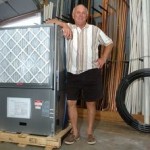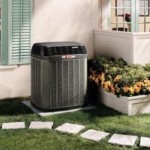Nobody wants to think about having to replace a home heating and cooling system. It’s a big job and a new system probably won’t come cheap – not if it’s worth buying anyway. But in the end, you’ll be better off replacing your heat pump sooner rather than later if you start noticing signs that it may be on its way out.
So what are these signs? Well, they’re actually pretty easy to recognize if you know what to look for. For instance, if your heat pump is suddenly making more noise than it used to, there’s a good chance that something’s going wrong inside. This may only require a minor repair, but if minor repairs like this become a regular occurrence, you should start seriously thinking about looking around for a new system.
The cost of even minor repairs will certainly add up quickly over time, and you’ll have to seriously think about whether it makes financial sense to continue to repair an older system rather than simply replacing it with a new one. Chances are that you’ll have to invest in a new one anyway, and the sooner you do it, the less you’ll have paid for repairs to a system you were just going to get rid of anyway.
Also, if you’re starting to notice humidity problems in your home or if some parts of your house are being kept warmer than others, it may very well be a sign that you heat pump isn’t working like it should. Again, this can sometimes be rectified with repair work, but especially if your heat pump is 10 years old or more, it probably makes more sense to replace it.
Another item to keep an eye on when you’re worried about how well your heat pump is working is your monthly energy bill. If you notice a sudden or even a gradual but steady increase over time that you know isn’t a result of an increase in energy prices in your area, you should suspect that your heat pump isn’t working like it should.
Even if it’s still keeping your home at a comfortable temperature, the fact that your heat pump is using more energy to do it is a sign that there’s something wrong with your system. Plus, newer systems are generally more energy efficient anyway, so you’ll be making up for the initial investment of purchasing a new system when you start paying even less on your monthly energy bills.
Nobody wants to think about having to replace a home heating and cooling system. It’s a big job and a new system probably won’t come cheap – not if it’s worth buying anyway. But in the end, you’ll be better off replacing your heat pump sooner rather than later if you start noticing signs that it may be on its way out.
So what are these signs? Well, they’re actually pretty easy to recognize if you know what to look for. For instance, if your heat pump is suddenly making more noise than it used to, there’s a good chance that something’s going wrong inside. This may only require a minor repair, but if minor repairs like this become a regular occurrence, you should start seriously thinking about looking around for a new system.
The cost of even minor repairs will certainly add up quickly over time, and you’ll have to seriously think about whether it makes financial sense to continue to repair an older system rather than simply replacing it with a new one. Chances are that you’ll have to invest in a new one anyway, and the sooner you do it, the less you’ll have paid for repairs to a system you were just going to get rid of anyway.
Also, if you’re starting to notice humidity problems in your home or if some parts of your house are being kept warmer than others, it may very well be a sign that you heat pump isn’t working like it should. Again, this can sometimes be rectified with repair work, but especially if your heat pump is 10 years old or more, it probably makes more sense to replace it.
Another item to keep an eye on when you’re worried about how we
Nobody wants to think about having to replace a home heating and cooling system. It’s a big job and a new system probably won’t come cheap – not if it’s worth buying anyway. But in the end, you’ll be better off replacing your heat pump sooner rather than later if you start noticing signs that it may be on its way out.
So what are these signs? Well, they’re actually pretty easy to recognize if you know what to look for. For instance, if your heat pump is suddenly making more noise than it used to, there’s a good chance that something’s going wrong inside. This may only require a minor repair, but if minor repairs like this become a regular occurrence, you should start seriously thinking about looking around for a new system.
The cost of even minor repairs will certainly add up quickly over time, and you’ll have to seriously think about whether it makes financial sense to continue to repair an older system rather than simply replacing it with a new one. Chances are that you’ll have to invest in a new one anyway, and the sooner you do it, the less you’ll have paid for repairs to a system you were just going to get rid of anyway.
Also, if you’re starting to notice humidity problems in your home or if some parts of your house are being kept warmer than others, it may very well be a sign that you heat pump isn’t working like it should. Again, this can sometimes be rectified with repair work, but especially if your heat pump is 10 years old or more, it probably makes more sense to replace it.
Another item to keep an eye on when you’re worried about how well your heat pump is working is your monthly energy bill. If you notice a sudden or even a gradual but steady increase over time that you know isn’t a result of an increase in energy prices in your area, you should suspect that your heat pump isn’t working like it should.
Even if it’s still keeping your home at a comfortable temperature, the fact that your heat pump is using more energy to do it is a sign that there’s something wrong with your system. Plus, newer systems are generally more energy efficient anyway, so you’ll be making up for the initial investment of purchasing a new system when you start paying even less on your monthly energy bills.
ll your heat pump is working is your monthly energy bill. If you notice a sudden or even a gradual but steady increase over time that you know isn’t a result of an increase in energy prices in your area, you should suspect that your heat pump isn’t working like it should.
Even if it’s still keeping your home at a comfortable temperature, the fact that your heat pump is using more energy to do it is a sign that there’s something wrong with your system. Plus, newer systems are generally more energy efficient anyway, so you’ll be making up for the initial investment of purchasing a new system when you start paying even less on your monthly energy bills.
Continue Reading
Tags: Blooming Glen, Bucks County, Energy Savings, Heat Pump Systems, Heat Pumps, Mainland, Montgomery County, Sellersville
Posted in Heat Pump Systems | Comments Off on When Should You Replace Your Existing Heat Pump?




